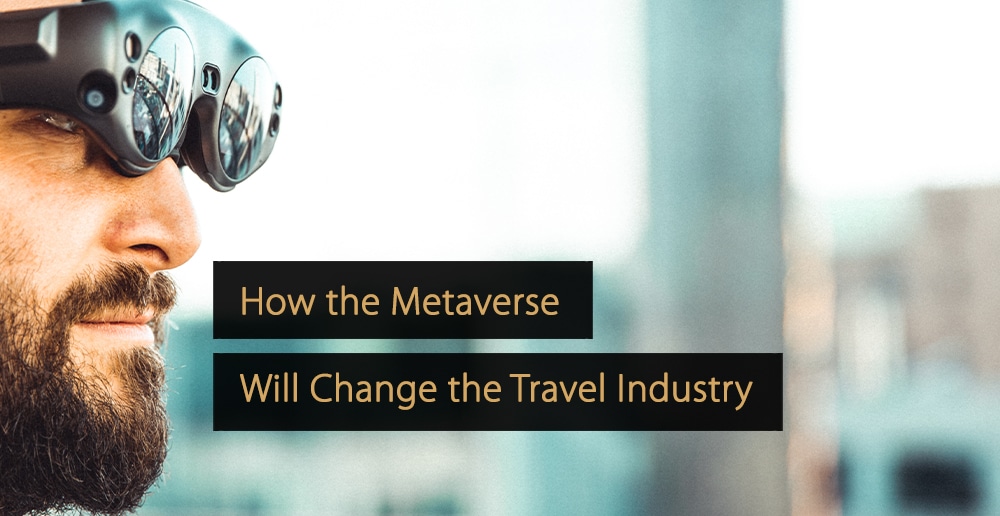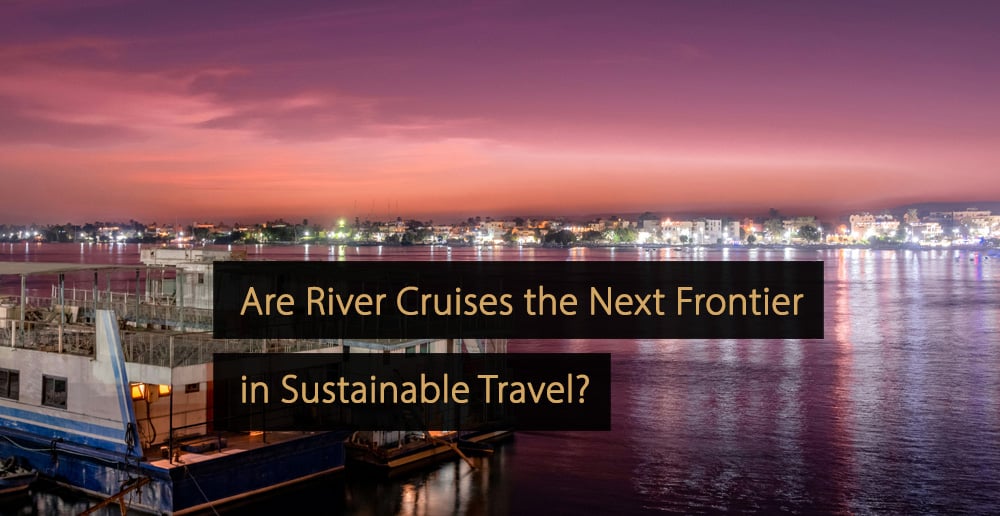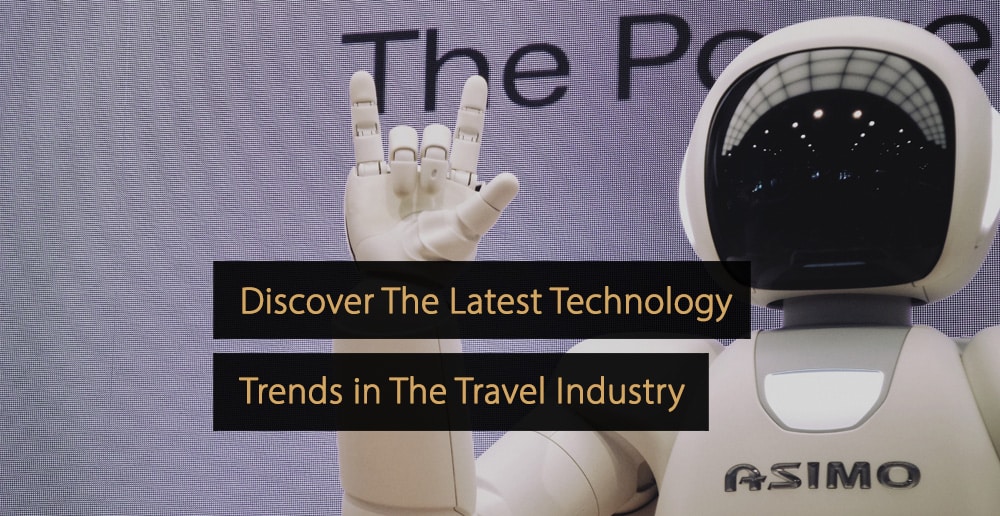Metaverse travel could revolutionize the way that people engage with the travel industry. Picture a scenario where you can explore a hotel in virtual reality (VR) while you sit in your home on the other side of the world. By creating three-dimensional models of real locations, metaverse travel will create new experiences and new ways for people to choose accommodations and activities.
Table of Contents:
- What is the Metaverse?
- What is the Difference Between the Metaverse and Virtual Reality?
- What Is the Travel Industry?
- Metaverse Influence on the Travel Industry
- Which Devices Are Used to Access Metaverse Travel?
- How Could the Travel Industry Benefit from the Metaverse?
- Examples of the Travel Industry Taking Advantage of the Metaverse
- Examples of Businesses in the Hospitality Metaverse
- Blockchain Technology and Hospitality
- VR and the Travel Industry
What is the Metaverse?
The metaverse has become a popular buzzword. Originating from science fiction author Neal Stephenson’s novel Snow Crash, the term “metaverse” describes a virtual 3D world that people can explore through VR goggles and other equipment. It’s a broad term for immersive virtual realms where people can interact with each other and the environment. Users can visit the metaverse using fully immersive VR equipment or augmented reality (AR) systems that project parts of the metaverse over the individual’s real surroundings.
Users can also access the metaverse through mobile devices like tablets and smartphones, or game consoles. This will, of course, be less immersive. The metaverse is still in its early stages, as virtual reality technologies still need to be refined, and the whole concept is evolving. We don’t yet know how metaverse travel may impact the industry.
What is the Difference Between the Metaverse and Virtual Reality?
It’s unclear how the metaverse will differ from existing virtual reality experiences. It can be tempting to dismiss the metaverse concept as an attempt by Mark Zuckerberg and other enthusiasts to rebrand the existing concept of VR and put their own stamp on it. While there’s a degree of truth, it’s worth exploring the proposed differences between these concepts. The things that differentiate the metaverse from VR could be described as broadness and utility.
VR games might be fun but limited in scope; you explore a defined game world, engage in a defined range of actions, and follow a game script. In the metaverse, the idea is that you’d be engaging in a wider range of activities — attending meetings, exploring the world around you, engaging with other people in the same part of the metaverse, and so on. Metaverse travel would let you enjoy travel experiences in VR.
What Is the Travel Industry?
The travel industry provides services that are related to travel. This isn’t limited to transportation and other services related to traveling from one place to another. It also extends to providing food and beverages while traveling and taking care of customers’ needs once they have arrived. There’s a significant overlap between the travel and hospitality industries. Although they’re closely linked, the travel industry is distinct from the tourism industry.
The tourism industry is centered around providing services for travelers traveling to a specific destination and wishing to explore and engage with that location. The travel industry is somewhat broader in scope, covering all kinds of journeys for many different purposes beyond tourism. The travel industry includes airlines, rail and coach services, water transport, etc, and travel management includes accommodation and catering for travelers. Metaverse travel could soon be another feature of the industry.
In “Travel Industry: An Overview of One of the Largest Service Industries”, you’ll gain an in-depth understanding of this topic.
Metaverse Influence on the Travel Industry
The rise of COVID and the introduction of travel restrictions have changed how people view travel. With many countries blocking incoming flights, stipulating long quarantine periods, or insisting on expensive tests, many people are turning away from physical travel and looking for alternatives. Even when restrictions are lowered, the risk of contracting COVID and other infections has made people reconsider their usual approach to travel.
This change in perspective has naturally led to new travel trends, and a growing interest in VR and metaverse travel solutions. For those who would normally travel as a way of experiencing the world, metaverse travel offers a safer and less costly way to explore new locations. Online meetings and classes have become increasingly popular for businesses and travelers with work or study goals. Metaverse travel could likely fill this niche in the future. The technology isn’t available to provide a full-blown metaverse holiday yet, but it may well exist in years to come.
Video: How the Metaverse Will Transform the Travel Industry
Which Devices Are Used to Access Metaverse Travel?
It is possible to access the metaverse with many different devices. Read below all the different ways to view and interact with metaverse travel.
Mobile Phones and Computers
While the concept of metaverse travel is intimately connected with VR headsets, the most typical ways to access the metaverse are still personal computers and mobile phones. Any digital device with sufficient processing power, a large enough screen, and a suitable input method can access the metaverse.
Because metaverse applications are computationally intensive, they usually work better on a computer than on the phone. Computers are more flexible and easier to configure. That said, newer and faster phones can cope with the demands of VR apps and are preferred by some users.
VR Headsets
A virtual reality (VR) headset is a wearable device that resembles a heavy pair of goggles. Inside the headset are two small screens that cover the wearer’s eyes, supplying stereoscopic images. Motion sensors in the headset pick up the wearer’s movements, and headphones deliver audio.
Through stereoscopic visual input, stereo sound, and head movement tracking, these headsets allow users to experience an immersive digital world. VR headsets are often used with video games but have a range of other applications. They’re used for training, rehabilitating various injuries, virtual meetings, and, of course, for metaverse travel.
AR Data Glasses
Augmented reality (AR) data glasses work similarly to VR headsets, allowing users to view a digital world by wearing them. While VR is completely immersive and replaces the wearer’s visual field entirely with digital information, AR overlays virtual elements onto what the user sees in real life.
AR needs to process images of the real world in real-time while combining this feed with digital elements. At the same time, AR glasses need to be lighter and less bulky than VR headsets. These two factors mean that AR gear tends to be much more expensive than VR.
MR Headsets
MR, or mixed reality, is similar to augmented reality. It combines a view of the real world with virtual elements. While AR typically consists of a passive visual overlay. However, the digital objects in MR are interactive. For example, the user can pick up a digital cup on a real tabletop.
Because of this interactivity, mixed reality is much more difficult to achieve than AR or VR and requires more sophisticated equipment. This means that MR is significantly more expensive than either VR or AR and less common.
How Could the Travel Industry Benefit from the Metaverse?
On the surface, the metaverse might threaten the travel industry. After all, if people can experience new locations in a virtual 3D space, they might not choose to travel physically. Yet it’s unlikely that the metaverse could ever entirely replace physical travel and only become a part of travel technology.
Expanding Travel Inspiration Sources
The metaverse’s most obvious benefit is providing new and better travel inspiration sources. The metaverse will likely supplement the travel industry, giving prospective travelers a taste of what they can experience. It will be possible to let travelers inspect hotel rooms and other spaces before booking, even allowing them to try the check-in process.
Travelers could take virtual tours and look at some of the main attractions in the area, encouraging them to visit in person and helping them decide how to spend their time and money once they reach the location.
Enhancing the Booking Experience
Metaverse travel could also make the booking experience more pleasant and engaging. While more people book online nowadays, there’s a certain level of engagement that a website can’t provide.
Booking in the metaverse might be more like visiting a brick-and-mortar travel agency, allowing users to ask questions of a (real or virtual) agent, negotiate deals, combine products and pay easily and conveniently. Once customers are at their destination, they can still use the metaverse to raise issues, order food and services, or look into attractions and experiences they could book via the metaverse.
Increasing Booking Volume
For those who travel to experience different locations, there are some things the metaverse probably won’t be able to provide, even with technological advances. Even the most detailed 3D recreation of a space can’t fully duplicate the experience of being there. Instead, metaverse travel can whet a user’s appetite for the real thing.
Travelers who take a VR tour of a location or use VR to try out an experience are likelier to book the real thing. One example would be Thomas Cook’s VR excursions of Manhattan, which offered visitors to their stores a five-minute “taster” of the city. The company saw a 190 percent increase in related bookings.
Examples of the Travel Industry Taking Advantage of the Metaverse
While the metaverse is still in its infancy, some travel companies already use the new technology.
Immersive Virtual Traveling – VR Tourism
Some organizations are already providing virtual 3D versions of real-life spaces and locations. For example, you can now explore the Louvre Museum Paris, in VR. Virtual visitors can view exhibitions, enjoy concerts, or even meet friends for a virtual stroll around the museum.
The metaverse can provide people (who might not be able to travel physically) a way to explore the world, either as a substitute for an in-person visit or as a way to prepare for an upcoming trip. The travel industry can benefit from this new technology by offering virtual tours and excursions via the metaverse.
Augmented Reality in Travel
Augmented reality is different from virtual reality. Instead of being immersed in a virtual world, virtual elements are overlaid with the real world around you. A familiar example would be Pokemon Go, where a user sees the titular monsters overlaid in the real world as seen by their phone’s camera.
In the context of metaverse travel, augmented reality can provide prices and details for a restaurant, historical information about a building, train times and connections from a station, and more. This encourages travelers to engage more fully with their location and offers opportunities to make additional purchases.
Read “How Augmented Reality is Revolutionising the Travel Industry” for a deep dive into AR.
Facilitating Online Trade Shows and Expos
Metaverse Travel is already providing new ways to conduct trade shows and expos. In 2022, students from Assumption University’s tourism program designed and realized a three-in-one expo in the metaverse featuring career, travel, and tourism expos.
Event Management students developed virtual exhibition booths to showcase travel brands like Hyatt, Hilton, and Marriott-Starwood, focusing on career opportunities. It’s easy to see how this immersive online experience could be used for all kinds of trade shows across many industries. However, it’s of particular relevance to the travel sector. Virtual trade shows and expos can help travel companies market their services in a new and exciting way.
Virtual Theme Parks and Other Attractions
With COVID restrictions limiting travel and shutting down some destinations, theme park fans increasingly turn to virtual versions of their favorite rides and attractions. First-person video footage of rides and other theme-park experiences is nothing new, but the metaverse allows users to experience attractions differently.
Imagine visitors booking a virtual zoo tour, for instance, or taking a “ride” on a roller-coaster without the queues. Virtual attractions could be a new source of revenue for beleaguered resorts and theme parks at a time when visitors may be unable or unwilling to come in person.
Examples of Businesses in the Hospitality Metaverse
Some hospitality businesses already have a presence in the metaverse. Here are some examples of businesses making inroads into the metaverse travel space.
Coachellaverse
The Coachella Valley Music and Arts Festival has come a long way since its founding in 1999. In recent years, event organizers have adopted Web3 and metaverse travel technology. Fans who can’t attend in person can still participate in the fun through various immersive digital options in the Coachellaverse.
The Coachellaverse is a virtual platform where visitors can connect with other guests, enjoy AR experiences, play video games, and purchase collectible NFTs. There are live shows on the platform and interactions with artists and performers.
Video: Coachellaverse | Coachella 2022
Vueling
Vueling has entered the metaverse travel space with its Seamless Travel Companion app. This app uses the Iomob software solution to allow users to plan and book door-to-door journeys on a single platform. With the app, customers can book their airport taxi, flight, and shuttle to their hotel all in one place.
The app also lets users arrange travel once they’re at their destination. The app connects users with a huge network of ground vehicles, parking providers, and other services. The Seamless TRavel Companion app will also provide users a convenient way to purchase services in the metaverse.
RendezVerse
RendezVerse is a metaverse hospitality platform. It allows companies to create replicas of real-life hotels and other properties in the metaverse. These digital hotels are virtual spaces where event planners and organizers can hold meetings, conferences, and other events in the metaverse.
RendezVerse innovates in the metaverse travel space, using blockchain-based Web3 technology to develop “metaverse-as-a-service” products for various companies. Hotel companies can collaborate with RendezVerse to create digital twins of their properties in the metaverse, leasing the virtual space to their clients.
Video: The Virtual Hotel (in the Metaverse)
Qatar Airways
QVerse is Qatar Airways’ metaverse product. It’s a new VR experience for customers visiting the Qatar Airways website. QVerse is built using the Unreal Engine from Epic Games. This is the game engine behind some of the most successful online video games of recent years, making it ideal for creating an interactive virtual experience.
QVerse also uses MetaHuman Creator, an advanced cloud-based app for creating high-quality virtual human models. This has allowed Qatar Airways to introduce Sama, a virtual cabin crew member who can interact with visitors and help them with queries.
Video: Introducing QVerse
Pinktada
Pinktada offers a unique way to book hotel stays. Instead of creating a non-transferable hotel booking, customers who book with Pinktada purchase an RNT (Room Night Token). Each RNT represents an individual room and a specific night — not just any room at a hotel but a specific room number.
Once purchased, a token can then be redeemed for a hotel stay. Alternatively, it can be swapped for a different RNT if a token holder decides to revise their travel plans. Customers who need to change their bookings can also sell an RNT back to Pinktada for PinkCash, a digital currency that can be used to buy more RNTs.
Mövenpick
In a previous section, you were introduced to RendezVerse, the metaverse-as-a-service provider creating virtual hotels online. One such hotel is Mövenpick Hotel Amsterdam City Center. Mövenpick is creating virtual metaverse travel spaces. Specifically, they’re creating a digital twin of the Mövenpick Hotel where guests can book virtual spaces for conferences, business meetings, and more.
Another business working with RendezVerse is ijVENUES. Mövenpick Hotel and ijVENUES will work with clients to select, book, and decorate virtual spaces in the metaverse. This collaboration is innovative and will surely attract attention to the metaverse travel concept.
Seoul
Metaverse Seoul is an ambitious Seoul Metropolitan Government (SMG) project. It’s the first-ever municipal virtual platform, a groundbreaking development for the metaverse. This virtual space will offer a wide range of commercial and public services and provide new possibilities for metaverse travel.
The ideals behind the space are “freedom, connection, and inclusion”. Metaverse Seoul is planned to be a hyper-realistic smart city in cyberspace, open not just to residents of Seoul but virtual visitors from all over the world. Rather than a digital twin, Metaverse Seoul is intended to provide a space for connection and creativity.
Video: Seoul to test the city’s own metaverse platform
Barbados
Decentraland is one of the biggest players in the metaverse. It’s a virtual world where clients can buy digital real estate and set up buildings, venues, stores, and even virtual theme parks. While many individuals and major companies have staked claims in Decentraland, Barbados is the first government to do so.
They have created a metaverse embassy where they hope to conduct “virtual diplomacy”. If the Decentraland embassy succeeds, the Barbadian government hopes to inspire other nations to adopt similar schemes. They also plan to open further embassies on other metaverse platforms.
Millennium Hotels
Another adopter of Decentraland’s virtual real estate is Millennium Hotels and Resorts. They use the browser-based platform to develop their M Social brand in the metaverse. They were the first company to open a metaverse hotel and are expanding the concept further.
The first virtual M Social hotel is modeled after Millennium Hotels’ real-life M Social portfolio. It was created to provide a new way for potential customers to explore their properties before booking. The virtual space can also be booked for metaverse conferences and meetings, with organizers able to select decor and themes to create the ideal online space.
Video: Millennium Hotels and Resorts
New Frontier
New Frontier is a Scotland-based company with a singular goal: to create a digital twin of the Great Tapestry of Scotland that people could visit in the metaverse. This is a five-star attraction in the real world, attracting visitors from far and wide to view it in its location in Galashiels. Recreating the Great Tapestry in all its detail was no mean feat and required significant investment.
New Frontier created a line of NFT art to secure funding for the project. Themed around concepts drawn from the tapestry itself, these one-of-a-kind digital artworks were used to pay for the intensive work required to make a digital version of the tapestry.
Emirates
Emirates is another major company making inroads into the metaverse. As well as having its own line of NFTs, the airline has been at the forefront of adopting virtual technology. One of its major innovations has been an immersive 360-degree model of a cabin interior, allowing prospective passengers to explore the cabin and even inspect their seats before they fly.
Emirates was one of the first companies to do this. They were also one of the first companies to launch its own app for the Oculus store, which provides software for the Oculus VR system. All in all, Emirates has been a trailblazer in metaverse travel.
Video: Emirates Airline
Blockchain Technology and Hospitality
Curious about blockchain technology? This recent innovation is set to change how many people conduct transactions online. Blockchain technology is especially relevant for the hospitality and travel industries, facilitating payments and offering new ways to provide ticketing and identification.
As a virtual public ledger, blockchain technology creates a permanent record of all transactions, complete with time stamps and other vital data. To learn more about blockchain technology’s relevance for the hospitality sector and metaverse travel, read “Blockchain Technology and Its Uses in the Hospitality Industry”.
VR and the Travel Industry
From metaverse travel to quick VR tours, a virtual reality already has an outsized impact on how people choose destinations, make bookings, and discover travel inspiration. With VR headsets becoming a common consumer item, VR is rapidly finding its way into many people’s daily lives.
Despite having its roots in the gaming industry, virtual reality is becoming increasingly important to other sectors — particularly travel. To learn more about virtual hotel tours, virtual booking interfaces, VR excursions, and augmented reality, read “How Virtual Reality is Transforming the Travel Industry” today.
While its role will likely expand in the coming years, it’s unlikely that metaverse travel will ever replace real travel. It seems probable that metaverse technology will enhance and supplement the traditional travel industry, offering new ways to engage with potential customers.
More Tips to Grow Your Business
Revfine.com is the leading knowledge platform for the hospitality and travel industry. Professionals use our insights, strategies, and actionable tips to get inspired, optimize revenue, innovate processes, and improve customer experience.Explore expert advice on management, marketing, revenue management, operations, software, and technology in our dedicated Hotel, Hospitality, and Travel & Tourism categories.
This article is written by:
Hi, I am Martijn Barten, founder of Revfine.com. With 20 years of experience in the hospitality industry, I specialize in optimizing revenue by combining revenue management with marketing strategies. I have successfully developed, implemented, and managed revenue management and marketing strategies for individual properties and multi-property portfolios.









Leave A Comment